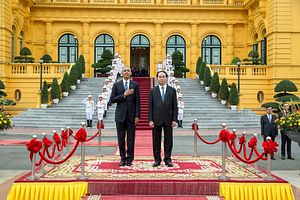On Monday, U.S. President Barack Obama nullified a decades-long arms embargo with Hanoi on the first of his three-day visit to Vietnam.
“Vietnam welcomed the U.S. government decision to fully lift the ban on the sale of lethal weapons,” Obama said in his remarks.
“This change will ensure that Vietnam has access to the equipment it needs to defend itself and removes a lingering vestige of the Cold War,” Obama told reporters, according to Politico.
Some in China interpreted the U.S. action as damaging to diplomatic relations and regional security.
In an editorial published Tuesday in the People’s Daily-owned Global Times, op-ed staff accused Obama of “exacerbating the strategic antagonism between Washington and Beijing.”
China’s Foreign Ministry spokesperson, Hua Chunying, was more reserved. Hua said in her daily press conference, “As a neighbor to Vietnam, China is happy to see Vietnam develop normal relations with all countries including the U.S.” Though, Hua added, China hopes the action would be “conducive to regional peace, stability and development.”
White House Deputy National Security Advisor for Strategic Communications Ben Rhodes said the purpose of Obama’s trip is to “rebalance” U.S. interests in the Asia-Pacific and expand commercial relations with the Vietnam. Rhodes described the region as “central to a whole host of critical U.S. national security interests.”
For years the Obama administration has focused on strengthening defense cooperation with Vietnam, including helping the government build its maritime security capabilities. Since 2014, the US has provided more than $45.7 million to Vietnam through the State Department’s Foreign Military Financing and law enforcement capacity building programs, according to a White House Fact Sheet.
Obama dismissed suggestions that the end of the Vietnam arms embargo was aimed at countering China’s growing strength in the region. Owing to the delicate balance of power in the Southeast Asia, many national security analysts are not convinced the move can be viewed in isolation—especially given Obama’s other statements on the trip.
On Tuesday, Obama said publicly that Washington would support the freedom of navigation and flight in the South China Sea—a contested area over which China claims sovereignty and where it has rapidly built up islands with dual-use infrastructure. The United States and an array of countries in the region — including China’s rival claimants such as Vietnam and the Philippines –consider the breadth of China’s claims to be counter to international law.
In his remarks on Tuesday, Obama iterated that larger nations should not “bully” smaller ones and that “disputes should be resolved peacefully.” Though he did not specifically mention China, many saw that remark as an allusion to the South China Sea conflict, where as recently as last week Chinese and U.S. military aircraft engaged in “unsafe” aerial maneuvers over the disputed territory.
In response to Obama’s statements, China’s Hua said, “every time the U.S. brings about freedom of navigation, I think it should first make clear whether it is talking about the real freedom of navigation enjoyed by all countries under international law or a ‘freedom’ exclusive to the U.S. military vessels and planes to do whatever they want.”
In a TIME opinion article titled “Why Lifting the Vietnam Arms Embargo Is All About China,” Pulitzer-winning national security reporter Mark Thompson suggests that if Obama had explicitly linked the embargo’s end to China’s maritime actions it may have provoked a military reaction from the rising superpower.
“Denying any linkage, they believe, simply delays an inevitable day of reckoning,” said Thompson, who went as far as to liken Obama’s removal of the embargo to the Gulf of Tonkin Resolution—an act which ultimately precipitated the Vietnam War.
Peter Bittner is an editorial assistant at The Diplomat.

































